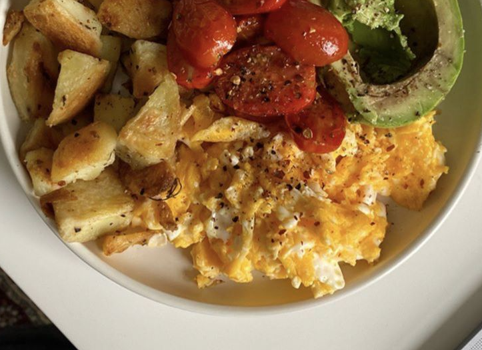Mediterranean Diet 101: A Meal Plan and Beginner’s Guide
What is the Mediterranean diet?
The Mediterranean diet is based on the traditional foods that people used to eat in countries bordering the Mediterranean Sea, including France, Spain, Greece, and Italy.
Researchers noted that these people were exceptionally healthy and had a low risk of many chronic conditions (1Trusted Source).
Although there are no strict rules or regulations for the diet, it typically encourages fruits, vegetables, whole grains, legumes, nuts, seeds, and heart-healthy fats. Processed foods, added sugar, and refined grains should be restricted (2Trusted Source).
Numerous studies have now shown that the Mediterranean diet can promote weight loss and help prevent heart attacks, strokes, type 2 diabetes, and premature death (3Trusted Source).
For this reason, the Mediterranean diet is often recommended for those looking to improve their health and protect against chronic disease.
Potential benefits
The Mediterranean diet has been linked to a long list of health benefits.
Promotes heart health
The Mediterranean diet has been studied extensively for its ability to promote heart health.
In fact, research shows that the Mediterranean diet may even be linked to a lower risk of heart disease and stroke (4Trusted Source).
One study compared the effects of the Mediterranean diet and a low fat diet and reported that the Mediterranean diet was more effective at slowing the progression of plaque buildup in the arteries, which is a major risk factor for heart disease (5Trusted Source).
Other research shows that the Mediterranean diet could also help lower levels of diastolic and systolic blood pressure to support heart health (6Trusted Source).
Supports healthy blood sugar levels
The Mediterranean diet encourages a variety of nutrient-dense foods, including fruits, vegetables, nuts, seeds, whole grains, and heart-healthy fats.
As such, following this eating pattern may help stabilize blood sugar levels and protect against type 2 diabetes (7Trusted Source).
Interestingly, multiple studies have found that the Mediterranean diet can reduce fasting blood sugar levels and improve levels of hemoglobin A1C, a marker used to measure long-term blood sugar control (8Trusted Source).
The Mediterranean diet has also been shown to decrease insulin resistance, a condition that impairs the body’s ability to use insulin to regulate blood sugar levels effectively (9Trusted Source, 10).
Protects brain function
Several studies show that the Mediterranean diet could be beneficial for brain health and may even protect against cognitive decline as you get older.
For example, one study including 512 people found that greater adherence to the Mediterranean diet was associated with improved memory and reductions in several risk factors for Alzheimer’s disease (11Trusted Source).
Other research has found that the Mediterranean diet may be tied to a lower risk of dementia, cognitive impairment, and Alzheimer’s disease (12Trusted Source).
What’s more, one large review also showed that following the Mediterranean diet was linked to improvements in cognitive function, memory, attention, and processing speed in healthy older adults (13Trusted Source).
How to follow it
- Eat: vegetables, fruits, nuts, seeds, legumes, potatoes, whole grains, herbs, spices, fish, seafood, and extra virgin olive oil
- Eat in moderation: poultry, eggs, cheese, and yogurt
- Eat rarely: red meat, sugar-sweetened beverages, added sugars, processed meat, refined grains, refined oils, and other highly processed foods
Sample menu
Below is a sample menu for 1 week of meals on the Mediterranean diet.
Feel free to adjust the portions and food choices based on your own needs and preferences, and add snacks as desired.
Monday
- Breakfast: Greek yogurt with strawberries and chia seeds
- Lunch: a whole grain sandwich with hummus and vegetables
- Dinner: a tuna salad with greens and olive oil, as well as a fruit salad
Tuesday
- Breakfast: oatmeal with blueberries
- Lunch: caprese zucchini noodles with mozzarella, cherry tomatoes, olive oil, and balsamic vinegar
- Dinner: a salad with tomatoes, olives, cucumbers, farro, grilled chicken, and feta cheese
Wednesday
- Breakfast: an omelet with mushrooms, tomatoes, and onions
- Lunch: a whole grain sandwich with cheese and fresh vegetables
- Dinner: Mediterranean lasagna
Thursday
- Breakfast: yogurt with sliced fruit and nuts
- Lunch: a quinoa salad with chickpeas
- Dinner: broiled salmon with brown rice and vegetables
Friday
- Breakfast: eggs and sautéed vegetables with whole wheat toast
- Lunch: stuffed zucchini boats with pesto, turkey sausage, tomatoes, bell peppers, and cheese
- Dinner: grilled lamb with salad and baked potato
Saturday
- Breakfast: oatmeal with raisins, nuts, and apple slices
- Lunch: a whole grain sandwich with vegetables
- Dinner: Mediterranean pizza made with whole wheat pita bread and topped with cheese, vegetables, and olives
Sunday
- Breakfast: an omelet with veggies and olives
- Lunch: falafel bowl with feta, onions, tomatoes, hummus, and rice
- Dinner: grilled chicken with vegetables, sweet potato fries, and fresh fruit
There’s usually no need to count calories or track macronutrients (protein, fat, and carbs) on the Mediterranean diet.
For more ideas, check out this list of 21 healthy Mediterranean recipes.
Healthy snacks
If you start feeling hungry between meals, there are plenty of healthy snack options you can enjoy on the Mediterranean diet.
Here are a few ideas to help you get started:




